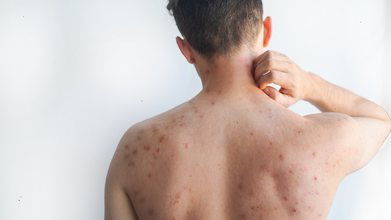- Health Conditions A-Z
- Health & Wellness
- Nutrition
- Fitness
- Health News
- Ayurveda
- Videos
- Medicine A-Z
- Parenting
'I Was Hallucinating A Gun', Celebrity Chef Heston Blumenthal Shares Terrifying Details Of Bipolar Struggles

Image Credits: Great British Chefs
Believing the TV was speaking directly to you or hallucinating a gun on a table—this was the terrifying reality for world-renowned chef Heston Blumenthal. Diagnosed with bipolar disorder in 2023, the culinary genius behind The Fat Duck experienced extreme mood swings, hallucinations, and suicidal thoughts before being sectioned under mental health care. What seemed like the darkest chapter of his life, however, turned out to be a turning point.
Blumenthal now calls being sectioned “the best thing that could have happened” to him, crediting it with saving his life. His journey from confusion and fear to self-awareness and advocacy sheds light on the complexities of bipolar disorder. As an ambassador for Bipolar UK, he now shares his experience to raise awareness, proving that even the most brilliant minds can struggle with mental health—and that seeking help is not a weakness, but a necessary step toward healing.
Celebrity chef Heston Blumenthal, who has been known for his experimental approach to cooking, has shared his own struggle with bipolar disorder. Diagnosed in 2023, 58-year-old Blumenthal has since emerged as an ambassador for Bipolar UK, making a point of using his public profile to help raise awareness and push for support for mental illness. His openness about having hallucinations and thoughts of suicide makes the extreme reach of the disease and the need to get treatment more clear.
Blumenthal initially made his diagnosis public in May 2023. Similar to many others who have bipolar disorder, he had extreme mood swings, from manic highs to depressive lows. His honesty about the condition has inspired thousands of people to open up to him about their own experiences.
In a recent interview, Blumenthal explained one of his most frightening symptoms: the feeling that his TV was talking to him. This type of hallucination is a common symptom of bipolar disorder and is both disorienting and distressing. Being open about such episodes helps normalize conversations about mental illness, still stigmatized in much of society.
Role of Family in Mental Health Support
Blumenthal's wife, Melanie Ceysson, was instrumental in his road to stability. It was she who eventually made the painful choice to have him sectioned, something that the chef now sees as life-saving. "If she hadn't done something about it, I wouldn't be here," he confessed in an interview. This indicates the important role that family and loved ones have in recognizing severe symptoms and intervening professionally when needed.
Being sectioned under mental health legislation is a severe step, yet for people going through intense manic or depressive attacks, it can save their lives and well-being. Blumenthal has admitted that being hospitalized was the "best thing that could have happened" to him, as it enabled him to access the medical treatment and stability he so urgently required.
What is Bipolar Disorder?
Bipolar disorder is a severe mental illness involving sudden changes in mood, such as manic highs and depressive lows. These mood swings can persist for days or weeks and can interfere severely with one's everyday life.
There are a few types of bipolar disorder:
Bipolar I Disorder: Involving at least one complete manic episode, which may be followed by depressive episodes.
Bipolar II Disorder: Includes episodes of severe depression and hypomania, a less severe form of mania.
Rapid Cycling Bipolar Disorder: Characterized by four or more mood episodes in a year.
Cyclothymia: A milder but chronic type of bipolar disorder characterized by continuous mood variation.
Typical symptoms of mania are high energy, less need for sleep, rapid thoughts, impulsiveness, and excessive confidence. Depressive episodes, on the other hand, can cause persistent sadness, lethargy, feelings of worthlessness, and suicidal tendencies.
Causes and Triggers of Bipolar Disorder
Though the cause of bipolar disorder is still not known, studies indicate a mix of genetic, biological, and environmental reasons behind its development. People who have a history of bipolar disorder in their family are at increased risk, showing a strong hereditary connection. Differences in the structure and function of the brain have also been observed in those with the disorder. Environmental precipitants, including trauma, major life events, and persistent stress, may also trigger attacks.
Importance of Awareness and Treatment
The move by Blumenthal to go public about his diagnosis serves to highlight the need for awareness and intervention early. Bipolar disorder, when untreated, has cataclysmic effects, ranging from an added risk of suicide. Research points out that persons suffering from bipolar disorder have a significantly increased chance of suicide and self-injury than the average population.
Successful treatment usually involves a combination of medication, including mood stabilizers and antipsychotics, and therapy. Cognitive Behavioral Therapy (CBT) and lifestyle changes, including regular sleep patterns and stress management, can also assist individuals in controlling their condition successfully.
As a Bipolar UK ambassador, Blumenthal aims to leverage his position to shatter the stigma of mental illness and neurodiversity in the workplace. "I want to campaign to draw attention to how neurodiversity can enrich the workplace," he said. His efforts are vital in establishing inclusive workplaces where people with mental illness feel valued and supported.
Unvaccinated Traveler Triggers Measles Outbreak in US, 17 Infected: CDC

Credit: Canva
The US Centers for Disease Control and Prevention (CDC) has stated that an unvaccinated person who traveled to the US from Europe spread measles to 17 others in the country last year.
In a paper published in The Journal of Infectious Diseases, the CDC highlighted the case of an unvaccinated traveler who arrived at the Denver International Airport in Colorado in May 2025.
The person traveled with a fever, persistent cough, cold-like symptoms, and conjunctivitis (“pink eye”). He stayed overnight in a hotel and then boarded another flight to North Dakota. A day later, the person developed a rash.
“The index case was in an unvaccinated adult. Aircraft contact investigations identified 135 exposed domestic travelers. Fifteen secondary cases were identified among people exposed during the international (5) and domestic (3) flights, and at the airport (7),” the CDC said in the paper.
“Two tertiary case-patients were also identified. Five of the secondary case-patients had at least one documented prior measles vaccination,” it added.
The 2025 US Measles Outbreak
While measles was declared eliminated in the US in 2000, and sporadic outbreaks were controlled quickly, falling vaccination rates, especially during the COVID-19 pandemic, raise the risk of larger, harder-to-contain outbreaks.
This was further compounded by the anti-vaccine stance of President Donald Trump and his Health Secretary Robert F Kennedy Jr.
As per the CDC, a total of 2,281 confirmed measles cases were reported in the US in 2025. In 2026, the agency reported 10 new outbreaks, with more than 1,000 measles cases confirmed to date. More than 90 percent cases each year occurred in the unvaccinated.
Air Travel Increases Measles Spread
Recently, two passengers from India infected with measles landed in Auckland, New Zealand, via Singapore Airlines.
The Straits Times quoted Associate Professor Lim Poh Lian, group director of the Communicable Disease Agency’s (CDA) Communicable Disease Program, who noted that the individuals developed symptoms only while onboard the flight from Singapore to Auckland.
“Measles transmission may occur during travel. Travelers with fever and other overt signs of transmissible illness, such as coughing or malaise, should be strongly encouraged to delay travel while symptomatic,” the US CDC said.
Vaccination Key To Tackling Measles
Measles is a highly infectious disease characterized by the three Cs:
- Cough
- Coryza or runny nose
- Conjunctivitis or red and watery eyes
It easily spreads from one infected person to another through breaths, coughs, or sneezes and could cause severe disease, complications, and even death.
Even though a safe and cost-effective vaccine is available, in 2024, there were an estimated 95,000 measles deaths globally, mostly among unvaccinated or under-vaccinated children under the age of 5 years, according to the World Health Organization (WHO).
The CDC recommends that all travelers aged 6 months or older get vaccinated before international travel.
Rajshri Deshpande’s Breast Cancer Diagnosis Highlights Importance of Routine Screening

Credit: Instagram
Sacred Games actress Rajshri Deshpande today informed of being diagnosed with grade 1 breast cancer and shared her journey of recovery.
In an Instagram post, the 43-year-old actress announced being diagnosed with the Infiltrating ductal carcinoma (NOS) -- the most common breast cancer type, accounting for roughly 80 percent of cases.
Importantly, the actress known for her work in Trial by Fire and Manto said that the deadly disease was detected during routine screening, initiating the road to early recovery.
“As you’re reading this, it means I’ve finally found the courage to tell my parents that I have been diagnosed with Infiltrating ductal carcinoma (NOS), a grade 1 Breast cancer. Now it’s time you all know,” the Instagram post read.
“We fortunately caught this early in a routine checkup, which gave us a fighting chance,” she added.
Rajshri called her treatment with ‘tons of tests and surgery” “a rollercoaster ride”.
“Trust me, it was everyone’s love and warmth that carried me through,” she said, while thanking her fans and her parents whose “faces after surgery melted my fears into unbreakable strength”.
“With everyone’s support, I feel am ready to take on the world,” Rajshri said, adding that she “is recovering beautifully and soon heading home from the hospital”.
What Is Infiltrating Ductal Carcinoma (IDC)
Also known as Invasive ductal carcinoma, the cancer occurs when abnormal cells growing in the lining of the milk ducts change and invade breast tissue beyond the walls of the duct.
Breast ducts are the passageways where milk from the milk glands (lobules) flows to the nipple.
Common symptoms of IDC include
- A lump or thickening in the breast or armpit area
- Changes in the size, shape, or appearance of the breast
- Nipple changes, such as inversion, discharge, or scaling
- Breast pain or discomfort
- Skin changes on the breast, like redness or dimpling
Key risk factors of IDC include
- Genetic mutations such as BRCA1 and BRCA2 gene mutations, and a family history of breast cancer
- Higher levels of estrogen
- Prolonged exposure to ionising radiation
- smoking
- excessive alcohol consumption
- obesity
- a sedentary lifestyle
Rising Early-Onset Cancers in women
The recent The Lancet Oncology study mentioned a rise in new cases in women aged 20-54 years (up 29 percent) since 1990.
Recently, American actress Christy Carlson Romano announced a positive cancer screening test.
Cancer is everywhere, said Romano, 41, in a tearful video on social media platform Instagram.
A 2025 study by Duke Cancer Institute in the US revealed that for women younger than 50, the risk of developing cancer is 82 percent higher than that of men, up from 51 percent in 2022.
The 2025 annual report from the American Cancer Society (ACS) also showed that cancer rates in young and middle-aged women are rising past those of men in the same age group, but especially among women under age 50.
Importance of Early Screening
As with Rajshri, catching cancer in its early stages can help individuals experience less severe symptoms, minimize discomfort, and improve overall quality of life.
Detection of cancer at an early stage can boost survival rates. It can increase the chances of successful treatment.
Common screening methods include
- Physical examination of your breasts by your doctor
- Mammography
- Breast ultrasound
- Breast magnetic resonance imaging (MRI)
Punjab Leptospirosis Outbreak: 36 Test Positive, 19 Children Hospitalized

Credit Canva
Punjab is grappling with an outbreak of leptospirosis, a rare bacterial disease, with 36 confirmed cases, including 19 children who have been hospitalized.
The outbreak is part of a larger water‑borne infection that has affected 110 people so far in Hazara Singh Wala, a border village in Ferozepur district. The hospitalized children are receiving care at Ferozepur Civil Hospital and are reported to be stable, according to media reports.
Leptospirosis spreads to humans through contact with the urine of infected animals such as dogs and rats. The disease previously made headlines in 2024 when Punjab Chief Minister Bhagwant Mann was hospitalized after contracting it.
The state health department reports that the outbreak is affecting mainly children and young people aged 3-25, with nearly 90 of the 110 symptomatic patients being minors, most of whom are school-going children, the Indian Express reported. Commonly reported symptoms include fever, abdominal pain, and jaundice.
Alarm was heightened in the district following the death of 12-year-old Sehaj Kaur from suspected Hepatitis E on February 24.
Investigations revealed that contaminated water, including rodent droppings and dead pigeons, contributed to the outbreak, causing widespread concern among villagers.
Media reports stated that health officials in the states are taking steps to prevent further spread of the outbreak. They are conducting house-to-house screenings, distributing chlorine tablets and oral rehydration solutions, as well as repairing water supply lines to contain the outbreak.
What Is Leptospirosis
Leptospirosis is usually a disease of animals like dogs, mostly rats, and some farm animals. It has also been reported in pigs, zebras, and horses.
It mainly spreads via contamination or through direct contact with loosely available food items or water infected with rat urine.
Common symptoms include:
- very high temperature
- headache
- muscular pains
- vomiting
- diarrhea
- yellow or brown patches in the eye,
- abdomen pain
While the disease is usually self-limiting and treatable with antibiotics, in severe cases it can spread to the kidney, brain, spinal cord, and liver and lead to death. It can also cause pulmonary haemorrhage, leading to respiratory failure and death.
Leptospirosis In India:
The neglected zoonotic disease is endemic to India due to a tropical climate that complements the transmission of infection.
The first disease outbreak was reported in the 1920s in the Andaman Islands.
As per the National Centre for Disease Control (NCDC), India is expected to report 0.1-1.0 million cases per year, but less than 10,000 cases are reported.
Only four states, i.e., Kerala, Gujarat, Tamil Nadu, and Maharashtra, report more than 500 cases per year as per IDSP Disease Alert.
Andaman, Andhra Pradesh, Assam, Goa, Delhi, Karnataka, Odisha, Puducherry, and Uttar Pradesh also report cases.
Due to a lack of awareness of the disease and a lack of suitable laboratory diagnostic capabilities in most regions of the country, leptospirosis has been under-reported and under-diagnosed in India.
© 2024 Bennett, Coleman & Company Limited

